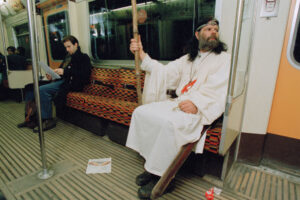Storm Eowyn, apparently named after a character from Lord of the Rings, roared like an army of uruk-hai across Ireland last week. It brought down hundreds of trees, tore off a lot of roofs, and left 700,000 of us without electricity. Here in rural Galway the lights were out in the townlands for days. Many still are. The city lost its water supply. We lost all the things that happen when you press buttons without thinking about it. Silence came.
We have a box of candles, matches, batteries and hurricane lamps stored for just this kind of occasion. Big bottles of water too, because our well runs on electricity. So do our solar panels, which switch off when the grid does. The stove that heats our front room is connected to a back boiler, so we can’t allow that to get too hot either when the grid is down. We’ve been talking about getting ourselves a generator for years, but we never get round to it. So much for self-sufficiency.
This Is Happiness, by Niall Williams is a novel set in rural County Clare during the Fifties, during the electrification of the country. It’s beautifully written and funny and moving. It seems to have no agenda and yet it shows well enough the mixed emotions that the coming of the electric wires brought to the countryside here. What was gained (easy to measure), what was lost (hard or impossible to measure) — but also what was illuminated. Not just previously hidden bald spots and wrinkles and layers of dust that a darkened cottage would never reveal even in high summer, but a world that, once the switches came, could never come back again. An older, stiller, subtler world.
I won’t say it came back again for the 48 hours that we were wire-free in our house. But something came. Some other rhythm. I sat by the fire with a whisky and did nothing at all. We read books instead of websites. Teenagers had no choice but to emerge from their bedrooms. We’re a low-tech household compared to most, but let’s not fool ourselves — we live in the miasma created by the grid. We are the grid. Without it, everything changes.
For the first 24 hours, I dreamed of living forever without electric power, and I reminisced with my wife about how much better life was in the Eighties and Nineties, before the web emerged to trap us. But there is no going back, at least not until nature loses her patience. The net is being hauled in, and us with it. This may not be Progress, but it is some kind of teleology, some kind of march, some kind of forward motion. I loved the stillness, but two days in, I missed the electric shower. The house got very cold. We are puffy, modern creatures, unused to life without our miasmic carapace.
The stillness, though: I loved the stillness.
Before the power cut, I was struggling with my words. Maybe the storm came to save me. Two weeks ago, I made a pilgrimage to Mount Athos. Agion Oros — the Holy Mountain — is a thousand-year old Orthodox monastic republic in northern Greece. It is not easily accessible, and nothing happens there except prayer. This has been true for a millennia. Every time I go there, something happens to me, and it is never what I expect. I try not to expect anything, but Athos always manages to upset me. I don’t mean that it makes me unhappy: I mean that it upsets my apple cart. It knocks me off my rails. Like the words of Christ which it exists to make manifest, it is not possible to honestly engage with it and remain comfortable. This time, Agion Oros seems to have brought me silence.
When the power was out in our house, more was absent than just the lights and the internet. Some feeling evaporated. The electrical grid does not just allow us to wash our clothes easily or watch TV; it changes us in some way. Some indefinable way. It gives, but it also takes. It takes away the silence; alters our bodies and minds and spirits.
In his 2018 book, In the Shadow of the Machine, the philosopher Jeremy Naydler suggests that electricity is a spiritual force. He shows how ancient cultures in Mesopotamia and Egypt understood atmospheric electricity as “a destructive power wielded by the deities connected with violent storms”. The Egyptian God Seth, for example, with whom the power of electricity was associated, “was a desert god implacably opposed to the forces of life”. In ancient Greece, electricity was a secret guarded by the Mystery Religions. Hesiod wrote of three primeval Cyclopes who represented the electrical forces, all of whom dwelled in the deep underworld. Until at least the 7th century, knowledge of this power was taboo.
Now there is a button for everything, and here we are. “A new type of consciousness” has permeated the world, says Naydler. “We may have the uncomfortable sense of human consciousness succumbing increasingly to the domain of gravity, as it became more and more overshadowed by the mechanistic outlook.”
Maybe when the lights go out, even for a while, and the current withdraws, a certain lightness returns. The gears and the cogs are forced into retreat.
Early modern experiments with electricity in the 1800s, explains Naydler, demonstrated that “an electric current was also seen to have a disintegrating effect on a substance to which it was applied”. Humphry Davy and other early pioneers found that applying electric currents to existing substances both broke them down and revealed their constituents for the first time. Many new chemical elements were discovered through this process that would allow science to forge ahead with its project of understanding, and thus ultimately controlling, material reality. This we call Progress.
I like to complain about the Machine, but the Machine is in me, and is me. Electricity has done its work, and that “new type of consciousness” has colonised my mind. I have struggled against it all my life. The rationalising, controlling, argumentative, wordy, left-hemisphere thing. The thing that does not contemplate, but instead argues. The thing that does not sit still, but instead writes. It has made me what I am.
On the Holy Mountain it was winter. The snow was thick on the peak and the woodland trails. It is a remote place, but it has succumbed too. They have electricity and internet, and the old mule paths have been replaced by roads, cars, buses. It was a mistake, I think. They should have resisted: should have shown us that it is still possible, even in one small place, to live without the miasma, without the new consciousness.
I still came home with this stillness, though. With this gulf within. It was prayer, I think, that made it. Maybe prayer and electricity are fighting a war. Maybe they are two kinds of hidden spiritual power, two forces which cannot be seen and yet which affect at some radical level the fate of our species and our world.
You can aim towards God, I think now, or you can keep the doors closed. You can let the electrical current pull you down into the world. It’s noisy down there. The current is noisy. Once the rooms begin to be cleared out, though, the silence comes. It starts to creep up. When you least expect it, it comes and sits in you.
In his book Man or Matter, Ernst Lehr, according to Jeremy Naydler, refers to the scientific revolution as the Second Fall. The first time around, Adam and Eve “succumbed to the temptation to acquire knowledge prematurely. This led to a certain illumination of human consciousness, but at the devastating cost of a separation from the original state of participation in the divine world.” The Second Fall, on the other hand, happened as a result of “human action outrunning knowledge.” We came to grasp and use natural forces that we did not yet understand. Forces like electricity.
“Men were exploring the electrical realm as it were, in the dark,” wrote Lehr. “It was a realm foreign to their ordinary ideas and they had not developed the forms of thought necessary for understanding it.”
It was deeply dark outside when the grid was down. There was no glow in the sky, no lights from within the house falling in squares upon the hard grass. A frost came in and settled on the lawn and the rocks and the car windscreen. The sky was cloudless, the stars were hard and crystalline. There was not a sound. The electrical wire that passes over our garden, connecting our house to the main line, can usually be heard to hum gently on a still night. Not tonight. There was no humming. Venus was low and golden on the horizon. I saw a shooting star. I heard an owl. I went back inside. The room was dimly lit with candles and the fire was low.
I still don’t feel like writing any of my ideas down. But I suppose I will. I succumb to gravity every day. The underworld gods of the electric wires do their work. They bring me down into the caverns of ideas, arguments, battles and will. Prayer lifts me, though. It lifts all of us, if we let it, above all the humming and into another silence.
Now I glance over at the box on the wall and I see, even as I am typing away, that the internet has gone down again. The storm is over, but the consequences are not. The consequences of the storm will never be over. Perhaps I will never be able to send you these words, and maybe that won’t matter. Words all dissolve in this ether. None of the words remain.
Only the silence, if you let it.
***
A version of this article first appeared on Paul’s Substack, The Abbey of Misrule.
Disclaimer
Some of the posts we share are controversial and we do not necessarily agree with them in the whole extend. Sometimes we agree with the content or part of it but we do not agree with the narration or language. Nevertheless we find them somehow interesting, valuable and/or informative or we share them, because we strongly believe in freedom of speech, free press and journalism. We strongly encourage you to have a critical approach to all the content, do your own research and analysis to build your own opinion.
We would be glad to have your feedback.
Source: UnHerd Read the original article here: https://unherd.com/




